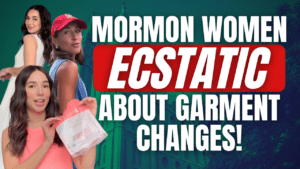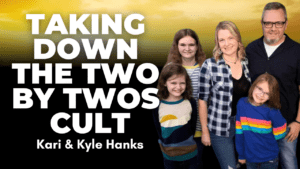In a gripping and vulnerable interview, Lori takes us on her journey of being raised in a picture-perfect Mormon household, only to find herself betrayed by the misogynistic teachings and practices of the Church. As a feminist trapped in a patriarchal system, she recounts the jarring experience of going through the temple for the first time, feeling like she had entered a cult. Despite her discomfort, she persevered for decades, until the cognitive dissonance and oppression of women triggered debilitating panic attacks and a mental health crisis. Lori’s courageous story is a testament to the strength it takes to break free from indoctrination, find one’s authentic self, and embrace true peace and equality outside the confines of orthodoxy. Her raw honesty about the harmful effects of Mormonism on women’s mental health and her path to healing and purpose will resonate deeply with anyone who has struggled to reconcile their beliefs with their lived experience.
988 Suicide & Crisis Lifeline | SAMHSA




17 Responses
Hi, thanks for this episode.
What were the feminist books she referenced?
Lori- enjoyed your podcast very much- we need a lot more women like you everywhere- especially in the church.Thank you very much Lori- Bob Tueller
So relatable! Thanks for sharing your story.
As a former active member, as I listened to the episode I was saying YES! Yes! Say it louder! It was so validating and freeing. This is a wonderful session for women who have suffered with panic and anxiety. Thank you, Lori, Margi and John. Thank you also for calling out the hotline number for suicide prevention: 988. Self care is not selfish.
This was a really beautiful story, thank you Lori.
I am not a Mormon and I live in the UK. I have a few Mormon friends who have had no issues with accepting that they needed mental health support, have had medication and therapy over the years and have even had counselling paid for by their church. Is this a more recent development (running parallel with a wider acceptance of mental health within society) or is this a UK thing that still wouldn’t happen within the LDS church in other parts of the world? I understand it was a different situation because Lori’s health deteriorated as a direct result of her beliefs and practices within her church.
I could not understand the book you spoke of. Something about the “sky”. Can you clarify? Thanks
It’s “Half the Sky.”
We have listened to or watched most of Mormon Stories Podcasts. Lori Young, you absolutely told my story in the church. I cannot believe how similar our experiences are! Right down to the MS, which our daughter was diagnosed with last August. (We will not tell our families because we are going to get..”well, that is what you get for leaving the church..”). Thank you Margi, John and Lori for being vulnerable and honest. I am still healing from the wounds that that organization caused my mind, body and soul. All the best to you, Lori! You can hold your head high!!
(Let me know if you want to co-author a book)
I’m so sorry your family will likely blame the diagnosis on leaving the church. That’s tough.
Both of my Mormon parents were divorced when they met and were the rebels of their small-town-Utah families. Don’t know how long they dated but I was born in Spokane Washington 8-months after they got married.
My parents felt they should provide a religious foundation for their children (3 eventually) so they dropped us off at the local ward for Sunday School and picked us up when it was over. They also took us to Primary on Wednesdays.
From an early age I remember having doubts about what I was taught in church, primarily around my sinful parents, that they weren’t good people.
None of the lessons from those days in church stuck with me, though I do remember being proud of the jewels I earned for memorizing Book of Morman scriptures I didn’t understand. Eventually we quit going to church at all.
Over the years I’ve had conflicted feelings about not being properly raised in the Mormon church because on both sides of the family, ours is the only one broken, and divorce is painful.
I used to think my parents’ divorce had more to do with them and the choices they made than the Mormon church but after listening to your podcast, I’m not so sure.
My free-spirited parents were probably suffocating under the high demands of their church and families and all they could think to do was flee the state of Utah.
As the quintessential black sheep of their families, they probably never received the non-judgmental support that they needed.
I believe they were wounded as teens and young adults so they rebelled against the stifling constraints of Morman doctrine and by abandoning the church, they did themselves and ultimately their children a favor. Thank you for telling Mormon Stories, this was a particularly good one.
This is one of my favorite podcasts. I relate so much in a personal way. Thank you.
Wow, the racism and othering of “Africa” here is really disgusting. Has she been to “Africa”? Does she know there are actually cities and hospitals there? Her stereotype of savages not going to school because they have no tampons is RIGHT out of the saviorist Mormon playbook. Please educate yourselves and don’t talk about things of which you are completely ignorant.
Racism. That’s what that was. Cut those sections or issue an apology.
I worked for a non-profit based entirely on educating and destigmatizing menstruation in rural parts of many African countries and provided clean, safe, reusable pads for free.
I recommend checking out the documentary she suggested, “Half the Sky” to become a bit more knowledgeable on what she was talking about.
Thanks. “Half the Sky” is based on a book by Nichola Kristof, who is a notorious white savior. And I think you really need to consider the parts of the US and the cultures within the US that stigmatize menstruation instead of making this an “African” issue. “Africa” has some of the largest and most sophisticated cities in the world and yet to white Americans “Africa” is rural people living in huts with menstrual stigma.
You are aware that many parts of Africa have more liberal abortion laws than the US, right? Why don’t you focus on that?
Mormons may leave the church. But few leave the saviorism behind. It’s not surprising to see Utahns and Mormons/ ex Mormons lauding Nicholas Kristof, unable to engage in critical thinking about his saviorism and colonialist tendencies.
https://www.artofcitizenry.com/podcast/episode-15-rescue-industry
https://humanityjournal.org/issue11-2/live-tweeting-and-distant-suffering/
https://www.theatlantic.com/international/archive/2012/03/the-white-savior-industrial-complex/254843/
https://melissagiragrant.com/nicholas-kristof-half-the-sky-all-the-credit/
Thanks for the links! They look very informative. Besides the general issue of white saviorism, are you saying there aren’t places in any African country with archaic ideas on menstruation?
No. I’m saying that using African countries to represent primitivism and backwards ideas instead of realizing that there are just as many primitive cultures and beliefs in white America is racist and colonialist.
We could just as easily look at abortion laws, the plight of women in Mormonism, or Ruby Ridge and their “menstrual hut” as just as primitive. But to white America, especially saviorist types, including and maybe especially Mormons, sub Sarahan Africa seems to exist only as a representation of all that is primitive. No one ever talks about the ways in which “Africa” is far more advanced than the West. And the ways it excels, despite white saviors.
Non-mormon here. Really enjoyed Lori’s church and life story. Love her authenticity. A great story for a lot of women to learn from. Thank you Lori.